- Home
- Peter Grainger
The Rags of Time
The Rags of Time Read online
Mark Randall lay dead in a field near Lowacre long before Smith had done what he had to do in Belfast. By the time he went back to work, the investigation was well underway. “It’s not my case” he says more than once, and he really doesn’t need it to be; he has enough to think about as it is. But going around the Norfolk countryside dotting the i’s and crossing the t’s, speaking to the local farmers and the Brothers of St Francis from Abbeyfields, Smith begins to suspect that the investigation might be heading in entirely the wrong direction. Arrests are made, charges are brought and Christopher Waters asks Smith if he has ever seen the wrong man convicted in a murder case. The answer is yes, and the next question is, what can be done to prevent it happening again?
Chapter One
Smith could see that Detective Inspector Alison Reeve was alone in her office, and so he wandered on down to admin support where Jane and Priti interviewed him about his operation. Was it true that he had nearly died on the table, that his heart had stopped? That was the story that had gone around for a few days. He told them that he had felt unwell afterwards and that the anaesthetist said he had had a mild reaction, that was all, but somehow they could see that he was being brave about it, that he didn’t want to frighten them by telling it like it really was, that they had, in fact, almost lost him. Priti had to get up and put her arms around him. She patted him on the back and said that they were happy to see him on his feet again and looking so well – she smelled delightfully of perfume and spices and over her shoulder he could see that Jane had a tear in her eye. Would he like a mug of tea while he waited? It was a very pleasant welcome back to Kings Lake Central police station.
There were ginger biscuits, too. He was on his second one when he saw John Wilson enter DI Reeve’s office and close the door. That was what he had intended – for Wilson to be there first, and so he would give them a minute or two alone together. If he, Smith, had been sitting comfortably in the detective inspector’s office waiting for Wilson, things might have got off to a bad start – the old question of his friendship with Alison Reeve might have got in the way. Now Wilson could have his say first and the two of them could have a moment of togetherness before Smith arrived five minutes later than he should have done, tea in one hand, biscuit in the other, limping a bit and looking as unprofessional as possible. The games we have to play…
‘Sit down, DC. You haven’t missed much.’
He took the seat next to Wilson, who nodded and then glanced openly at his watch.
‘Sorry I’m late, ma’am. Do you mean I haven’t missed much in the past two weeks or just in the past two minutes?’
She said, ‘Sadly, I’m sure you haven’t missed anything that’s gone on in the past fortnight.’
‘But I have had a near-death experience, ma’am. They can be very distracting.’
The look on Wilson’s face might have been interpreted as saying that the experience hadn’t been near enough as far as he was concerned.
DI Reeve said, ‘A mild reaction to the anaesthetic – that’s what I was told,’ but she was looking at him closely as she said that. Had he been referring to the operation or to something else? She remembered that night in The Lighterman’s Arms when she realised that something had happened to him in Belfast. He seemed to be his usual self now, and his uncharacteristic lateness to this meeting was probably some sort of ploy.
Smith drank some of the tea and finished the ginger nut – neither of the others had any sort of drink and he considered offering to fetch them one before they began the briefing, but things had been delayed enough. There was a case and he wanted hear about it.
Reeve said, ‘So if you’ve finished your breakfast?’
He nodded and gave them both a sunny smile.
She turned her laptop around – don’t we do anything on paper any more? – and there was a man’s face. He was alive, looking into the camera when it was taken, and it wasn’t a mug-shot; it was a little blurred, though, and Smith guessed that it was an enlargement from another photograph. He wondered what had been cut from around it, and why in almost a fortnight they had not been able to get a better picture. Before he could study the face properly, the detective inspector had pressed a key, and another image appeared. Now the man was dead – eyes glassy and half closed, the flesh of the cheeks sagging as if he had grown suddenly old, and as pale as the marble of the mortuary slab upon which the body lay. Another press of the key and Smith could see why he was dead. The back of the head had been crushed, flattened. The hair around the wound had been neatly shaved away - Olive Markham’s work, he guessed - so that it could be photographed. There was a mass of congealed blood in the cavity but little bruising beyond the area of impact; Smith had seen enough of these to know that death had come quickly after the blow.
Reeve said, ‘No doubt you’ve already had a look at stuff in the incident room. This is Mark Randall, or it was. He was found in this condition eleven days ago, in a field near Lowacre. Dead for several hours by the time he was found, and died in situ according to the blood-work.’
Smith said, ‘Found by whom?’
Alison Reeve looked at Wilson, clearly inviting him to take over or at least take a share in the briefing. Smith looked himself then and saw that Wilson had his notes open and ready; they were organised into numbered sections, typed and printed and, therefore, quite unusual.
Wilson said, ‘A Marie Wilkinson from Lowacre. She’s a jogger, runs that way early every morning. There’s a public footpath through the estate, and she spotted the body out in the field. Dialled 999 and waited – she didn’t go anywhere near it. She told me that she panicked after the call, thinking it might just be a scarecrow fallen over.’
Smith said, ‘If you left that out there for long, it would attract the crows, wouldn’t it?’
Wilson looked at Reeve, waiting for the nod to continue, which he duly received.
‘We got everything we needed from the scene over the next two days. It’s all written up and Chris has already copied it over to your PC, so I won’t go into a lot of detail now – if that’s OK, ma’am?’
The image of Mark Randall’s broken skull was still on the laptop’s screen. Smith stared at it for a little longer and then said, ‘I don’t think we got absolutely everything we needed, did we?’
Wilson said, ‘What do you mean?’
‘Well, we haven’t caught whoever did it, have we? Or are you coming to that?’
‘All I meant was…’
That the two of them would never be friends was so obvious it was well-known – for one thing, if Detective Sergeant Wilson had a sense of humour at all, it would be so incompatible with that of Detective Sergeant Smith that they would need a team of UN translators on permanent stand-by. But beyond that – which is, after all, a common enough situation to be found in every office or workplace in the land – there was another problem. It was Detective Sergeant Smith these days but once upon a time it had been Detective Chief Inspector. The small man holding the ‘I Love My Cat’ mug, with biscuit crumbs on his tie, had once led teams on cases much bigger than this one appeared to be.
Alison Reeve said, ‘John is right. He and I were on the scene that morning, and as far as I’m concerned it was well-managed. All the details are in the files that he has asked Chris Waters to transfer across to you. We don’t need to go through that now, that’s not what this meeting is for. We’re here to talk briefly about the way forward with this.’
Smith already had half a dozen questions about the investigation so far but those could wait. First, it was obvious that his boss was now in incipient-chief-inspector mode, and therefore this meeting was actually about staffing and resources rather than the case itself. Second, he had finally twigged why Wilson had had a proper shave and
typed up his notes. Third, even though the politics of structuring – more correctly he would say, of constantly restructuring – the modern police service was of no interest to him whatsoever, there was one question that needed to be answered before this went any further.
‘Ma’am – why are we dealing with this?’
Reeve looked at her laptop screen before she answered.
‘Because someone should not have done that.’
She had learned more than detective work from him.
‘Yes, ma’am, very good. But it’s a straightforward, good old-fashioned murder, isn’t it?’
She looked at the screen again before she responded, as if she needed to be sure.
‘Definitely.’
‘So why is Kings Lake dealing with it? When I went off two weeks ago, the county still had a murder squad. Has it been disbanded in my absence? If so, are the two events connected in some way? I know we’ve had some funny cases lately but they weren’t as open and shut as this one. He’s had more than a nasty bang on the head. Straightforward, premeditated murder. Call the murder squad.’
DI Reeve was having to think about the answer, so it must be a good question. Wilson thought he would come to the rescue. He said, ‘Can’t say for certain it was premeditated. Someone could have lashed out…’
‘With the large, heavy implement that just happened to be lying about in the field?’
Wilson wasn’t entirely wrong, of course; plenty of QCs had made their names and fortunes finding new and ever more inventive ways through the jungle of semantics that surrounds the notion of ‘premeditated’, but for now Smith was more interested in what Reeve had to say.
‘As far as I am aware, the county does still have a murder squad but I think that parameters and protocols are changing.’
She looked at Smith, fully aware of what he would think to such an answer, and he looked at her, fully aware that she would be fully aware. But this is what happens when you spend months preparing for promotion interviews – you end up saying things that you know are nonsense but you just cannot stop yourself.
He shrugged and said, ‘Oh, fair enough.’
She wouldn’t be able to leave it there, even though she knew exactly what he was doing.
‘What I mean is this. The specialist squads are having to rationalise like everyone else. As far as the murder lot are concerned, it seems that they will in future focus more on crimes in which there are multiple victims, serial cases and those with links to organised criminal activity. More… More local incidents that do not meet those criteria will be returned to districts. Perhaps ‘returned’ is the wrong word – they won’t go to a central squad in the first place.’
She was looking hard at him again, trying to get him to accept what she had said or at least to shut up about it for now, but Smith was intrigued; also, by the way she was talking, that new post would come sooner rather than later and he might not be able to have such conversations with her for much longer. It was highly unlikely that he would have anything like them with her successor.
‘Just a couple of points then, ma’am. First, who decides, in the first instance, which ones go to central? And second,’ with a glance at her laptop, ‘I’m not sure I’m comfortable describing that as ‘a local incident’.
Reeve did not answer him immediately. It was uncanny, but it was less than a week since she had been in a meeting of senior officers – her first – at county headquarters in which that question had been hotly debated for more than two hours. In some ways it had been an old-fashioned turf war, of course, but it also had wider and more profound implications; a mistaken initial allocation of a case could have endless repercussions. Had Smith heard about that meeting, or had his instincts and experience alone alerted him to the dangers?
Wilson was watching and waiting as well – and this was not what she wanted to be doing right now.
‘OK, we need to get on, DC. On your second point, you can call it whatever you like – I really don’t give a toss as long as we’re doing our best to find whoever did it. On the first point, the senior investigating officer in the district will decide whether he or she wishes to call in a specialist squad for assistance or whether to transfer the entire case to them.’
‘So, for us that will be Detective Superintendent Allen, ma’am?’
‘Yes, it will.’
He knew he had reached the limit of her patience and nodded his acceptance; he had given her cause enough to be brusque with him in front of Wilson, and that was useful, whether or not she realised it yet. Indeed, Wilson had a private smirk on his face at this very moment.
DI Reeve said, ‘So, John has been running six people on this up to now. Chris and Serena will come back to you this morning, DC, but obviously they will have things to be finishing for John – if they have any useful lines, they need to keep on with them for now.’
She paused, and all three of them knew why.
Smith said, ‘Of course. I’ve no problem with that at all. John’s the man up to speed on this.’ He looked at Wilson and continued, ‘You can talk to them directly or go through me, John – I really don’t mind. It will take me an hour or two just to do the reading.’
Wilson acknowledged the offer as genuine – not an easy one for any officer to make, though it was, by its nature, time-limited.
Reeve said, ‘Good. John, summarise where we are with this, please.’
When Smith summarised the summary to himself later on, sitting in front his PC, he concluded that they were somewhere and nowhere. Mark Randall had been a serious devotee of the metal detector for about as long as they had been in existence, and a serial offender as far as the illegal side of that hobby was concerned. He had magistrates’ convictions for trespass with intent and was known to uniform as one of the likely lads when nighthawk activity was being reported on their patch. Smith was on that page of his searches now; Google had first taken him to a species of American bird, the new world’s version of the old one’s nightjar, but then he had found what he was looking for – an account of the nefarious night-time deeds of men – always men – desperate to search the sites for which they knew they would never be given permission. It was quite an eye-opener. First, for some of these people it was much closer to an obsession than a hobby – you could even consider it some sort of illness. In his first few months as a young, uniformed policeman he had been involved in a case against egg collectors, stealing from the nests of rare waders on the coastal marshes, and he recognised some of the same character traits in these detectorists. Second, there was potentially some serious money involved. The nighthawks seemed to be of two kinds; those who were fanatics about the historical value of their finds and who labelled and hoarded them in drawers just like the egg thieves, and those who were looking for pieces to sell to unscrupulous collectors. There was, it seemed, a thriving black market in archaeological artefacts, especially the jewellery and the coins. So there was rivalry involved and possibly money as well. As far as Mark Randall was concerned, Wilson’s team – including two of his own – had already dug up some possible motives. ‘Dug up’ was rather good, in the circumstances.
Smith looked around the office. Waters and Butler were out on a job for Wilson, something that had been arranged the Friday before – Wilson had organised interviews of everyone known to be connected to the metal detector business, including the secretary of the perfectly legitimate and respectable local club in Kings Lake. That’s where they were now but they should be back soon. Beyond his own small circle of desks, he could see O’Leary and Jefferson of Wilson’s team, busily typing away. That’s what they had been doing since he arrived here, almost an hour ago, no chatting or looking across at Smith. Wilson had them hard at it, then. He smiled to himself. Wilson’s team would have noticed a change around about the time that news of Detective Inspector Reeve’s forthcoming promotion went public, no doubt. She had said after the meeting this morning that she needed another private word with him before the end of the day – it might
be all change more quickly than anyone expected. If Wilson became the new detective inspector, Smith might finally find out if he was any good at crown green bowls. He had often wondered about that.
There was plenty more to read – they had been busy but he didn’t relish the prospect of ploughing through all this, even though he would do so. It was one thing to come in as a new SIO on a case, as he had more than once, and quite another to be trying to catch up like a schoolboy who’s had the flu and missed some important lessons. He pressed the keyboard a few times and was back at the victim’s file. Then he sat for some minutes simply looking at the man’s picture, the one taken while he was still alive. The image did not give much away, which in itself might be revealing, but close study always reveals something.
Randall hadn’t shaved when the photograph was taken, and the hair was cut in no particular style; not the picture of a man much concerned about his appearance. He looked to be in his late thirties or early forties but had been forty eight on the day of his death – maybe the picture was a few years old. Why wasn’t there a more recent one? The file itself probably had a part of the answer to that; the next of kin was a brother who lived in Lowestoft, which meant there was no wife and presumably no children. No mention of parents or any other family, either. Smith focused in on the eyes, the eyes of Mark Randall, and thought, you were a bit of a loner, son.
There was a ring in the left ear – a proper small ring, not a stud. Whether or not that signified anything might depend on when he had it done. On many men it’s a statement that fails to say quite what they intended but it looked right enough on Randall, looked as if it had been there a long time. He was probably straight, then. Smith wondered whether the ring was gold – presumably it wasn’t one that he had dug up somewhere… Either way, and even though Randall was a sort of pirate in his own way, the ring wouldn’t pay for a funeral these days, and certainly not one that involved a coffin of Irish oak.

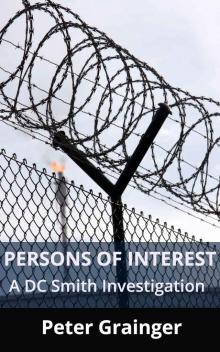 Persons of Interest
Persons of Interest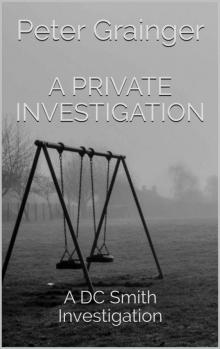 A Private Investigation
A Private Investigation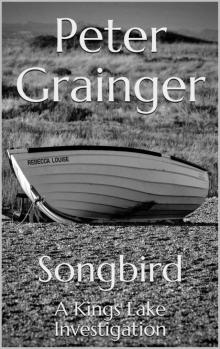 Songbird
Songbird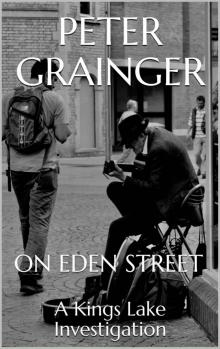 On Eden Street
On Eden Street An Accidental Death
An Accidental Death Time and Tide
Time and Tide An Accidental Death: A DC Smith Investigation
An Accidental Death: A DC Smith Investigation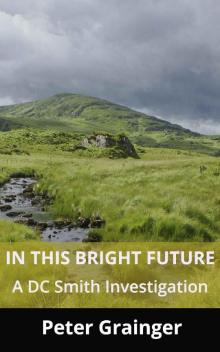 In This Bright Future
In This Bright Future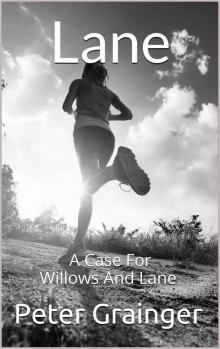 Lane: A Case For Willows And Lane
Lane: A Case For Willows And Lane The Rags of Time: A DC Smith Investigation
The Rags of Time: A DC Smith Investigation Luck and Judgement
Luck and Judgement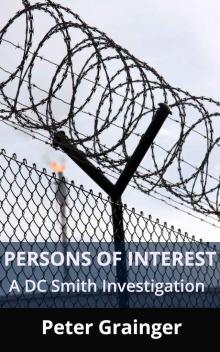 Persons of Interest: A DC Smith Investigation
Persons of Interest: A DC Smith Investigation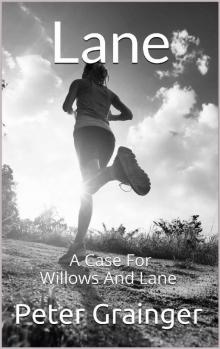 Lane
Lane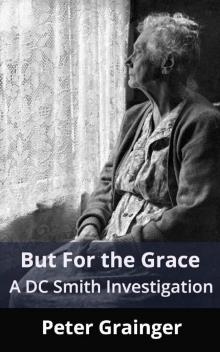 But For The Grace
But For The Grace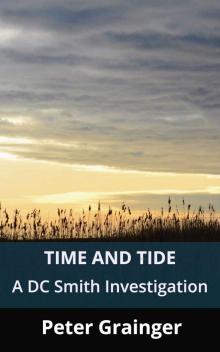 Time and Tide: A DC Smith Investigation
Time and Tide: A DC Smith Investigation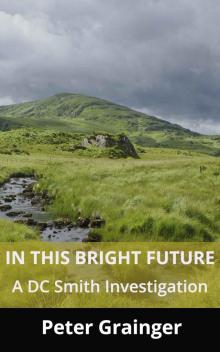 In This Bright Future: A DC Smith Investigation
In This Bright Future: A DC Smith Investigation The Rags of Time
The Rags of Time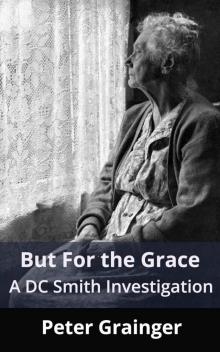 But For The Grace: A DC Smith Investigation
But For The Grace: A DC Smith Investigation Luck and Judgement: A DC Smith Investigation
Luck and Judgement: A DC Smith Investigation